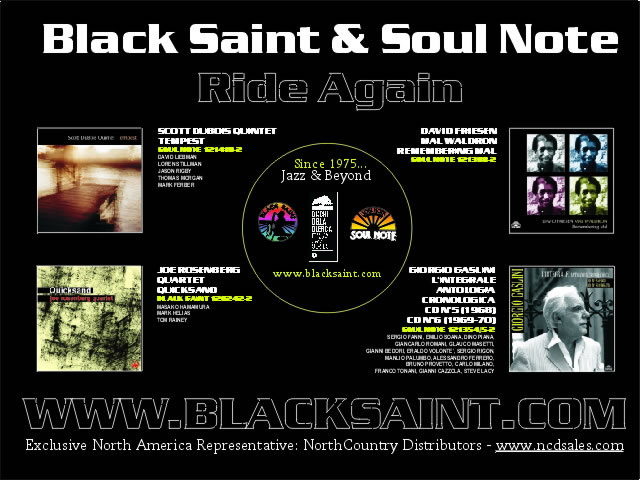Moment's Notice
Recent CDs Briefly Reviewed
(continued)
Alvin Lucier
Ever Present
Mode 173
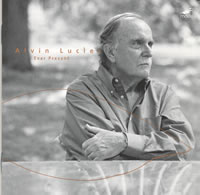 Sonic Union Arts vet Alvin Lucier articulated an arch, insidious type of confrontation with his most acclaimed piece, “I am Sitting in a Room,” which gradually turned a simple, tape-recorded text into jarring abstraction. But, he’s also accomplished at straight-up confrontation, as well. Both approaches are well-represented by the five compositions for acoustic instruments collected on Ever Present, each of which examine Lucier’s long-held interests in room acoustics and/or the relationships between rhythmic patterns, close tunings and spatial phenomena. Except for “Silver Street Car for the Orchestra” (1988), an in-your-face triangle solo that explores timbre and dynamics, the pieces were composed between 2000 and 2003, which suggest that Lucier’s 70s won’t be a genteel autumnal decade. “Piper” (2000) is performed by bagpiper Matt Welch, who exploits the acoustics of the performance space by slowly moving through it, building occasionally detuned long tones to create surreal, Doppler-like effects. The remaining pieces are more subtle, but no less radical. Scored for four kotos, “Fan” (2003) uses slowly ascending pitches and decreasing tempi to create mesmerizing shifting rhythmic patterns. “947” (2001), a solo written for flutist Jacqueline Martelle, achieves similar effects through the use of long and bent tones. “Ever Present” (2002) has a sly delicacy, as the long tones produced by saxophonist Armbruster, flutist Erik Drescher and pianist Akiko Okabe hover languorously, resulting in progressively powerful harmonics. It is a stunning, elegant piece of music.
Sonic Union Arts vet Alvin Lucier articulated an arch, insidious type of confrontation with his most acclaimed piece, “I am Sitting in a Room,” which gradually turned a simple, tape-recorded text into jarring abstraction. But, he’s also accomplished at straight-up confrontation, as well. Both approaches are well-represented by the five compositions for acoustic instruments collected on Ever Present, each of which examine Lucier’s long-held interests in room acoustics and/or the relationships between rhythmic patterns, close tunings and spatial phenomena. Except for “Silver Street Car for the Orchestra” (1988), an in-your-face triangle solo that explores timbre and dynamics, the pieces were composed between 2000 and 2003, which suggest that Lucier’s 70s won’t be a genteel autumnal decade. “Piper” (2000) is performed by bagpiper Matt Welch, who exploits the acoustics of the performance space by slowly moving through it, building occasionally detuned long tones to create surreal, Doppler-like effects. The remaining pieces are more subtle, but no less radical. Scored for four kotos, “Fan” (2003) uses slowly ascending pitches and decreasing tempi to create mesmerizing shifting rhythmic patterns. “947” (2001), a solo written for flutist Jacqueline Martelle, achieves similar effects through the use of long and bent tones. “Ever Present” (2002) has a sly delicacy, as the long tones produced by saxophonist Armbruster, flutist Erik Drescher and pianist Akiko Okabe hover languorously, resulting in progressively powerful harmonics. It is a stunning, elegant piece of music.
Mike Reed's Loose Assembly
Last Year's Ghost
482 Music 482-1055
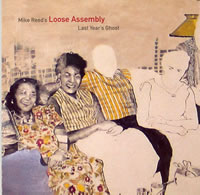 Chicago has a strong tradition of trailblazing musician-organizers, of which the AACM and Ken Vandermark are the most frequently cited examples. Add Mike Reed to the list, who has arguably received more mainstream recognition for founding the Emerging Improvisers Organization and producing the Intonation Music Festival than for his music. The drummer-composer’s first CD with Loose Assembly should initiate a more balanced appraisal of his activities, as it is a well-designed collection of hook-filled tunes and atmospheric interludes. The mid-register luminosity of his front line of alto saxophonist Greg Ward, cellist Tomeka Reid and vibraphonist Jason Adasiewicz highlights the melancholy of “Simone’s Crumbs,” while accentuating the Nichols-like gait of “Afterthoughts” and the slinky feel of “The Entire State of Florida.” On the latter, as well as tracks like the simmering “Ghost Writer,” Reed and bassist Josh Abrams lay down an infectious flexible groove that lets Ward churn, Reid soar and Adasiewicz sparkle. Loose Assembly also has an incisive approach to sound-based improvisation, be it the light industrial sound of “Flowers” or the Art Ensemble-informed “1974.” In lesser hands, this would have been a bumpy ride; but a big part, if not the core of Reed’s acumen as a composer-leader is making this wide assortment of materials a coherent whole. Though it has its merits, Reed’s only previous album – 2006’s In The Context Of, also issued by 482 Music – is a collection of impromptu duets with Jim Baker, Nicole Mitchell and Jeff Parker that, while documenting his considerable skill set as a percussionist and improviser, does not really prepare the listener for this fully realized statement. Just a few more recordings like Last Year’s Ghost and Mike Reed will be in the first rank of living American bandleaders.
Chicago has a strong tradition of trailblazing musician-organizers, of which the AACM and Ken Vandermark are the most frequently cited examples. Add Mike Reed to the list, who has arguably received more mainstream recognition for founding the Emerging Improvisers Organization and producing the Intonation Music Festival than for his music. The drummer-composer’s first CD with Loose Assembly should initiate a more balanced appraisal of his activities, as it is a well-designed collection of hook-filled tunes and atmospheric interludes. The mid-register luminosity of his front line of alto saxophonist Greg Ward, cellist Tomeka Reid and vibraphonist Jason Adasiewicz highlights the melancholy of “Simone’s Crumbs,” while accentuating the Nichols-like gait of “Afterthoughts” and the slinky feel of “The Entire State of Florida.” On the latter, as well as tracks like the simmering “Ghost Writer,” Reed and bassist Josh Abrams lay down an infectious flexible groove that lets Ward churn, Reid soar and Adasiewicz sparkle. Loose Assembly also has an incisive approach to sound-based improvisation, be it the light industrial sound of “Flowers” or the Art Ensemble-informed “1974.” In lesser hands, this would have been a bumpy ride; but a big part, if not the core of Reed’s acumen as a composer-leader is making this wide assortment of materials a coherent whole. Though it has its merits, Reed’s only previous album – 2006’s In The Context Of, also issued by 482 Music – is a collection of impromptu duets with Jim Baker, Nicole Mitchell and Jeff Parker that, while documenting his considerable skill set as a percussionist and improviser, does not really prepare the listener for this fully realized statement. Just a few more recordings like Last Year’s Ghost and Mike Reed will be in the first rank of living American bandleaders.
David Torn
Prezens
ECM 1877
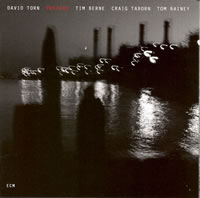 There’s a point where post-production becomes an art. Teo Macero proved that with his work with Miles Davis. David Torn is well on his way to joining that exclusive club. Unlike Macero, who had largely given up writing and playing by the time he signed on as the trumpeter’s producer, Torn can still be called a guitarist first and foremost. Arguably, Torn’s work with Tim Berne has been his most scintillating to date, particularly with the saxophonist’s riotous Hard Cell with keyboardist Craig Taborn and drummer Tom Rainey. In a brilliant move, Torn brings on the band for Torn’s first ECM date in 20 years. This latter factoid will undoubtedly be in every review of this album, but it’s pertinent in terms of the aesthetic distance Torn has traveled since the comparatively straight-faced Cloud Over Mercury with Mark Isham and King Crimsonites Tony Levin and Bill Bruford. Oversimplified, Torn gets the jokes and deadly serious rigor Berne, Taborn and Rainey throw down. More importantly, he understands how to super-charge their chemistry through the double-whammy of real-time playing and studio manipulations. The great thing about the set is that without the aid of the press release it’s nearly impossible to tell what’s live and what’s constructed. Suffice it to say that the music simply crackles with energy from beginning to end, that there is a continuous stream of envelope-shredding sounds, and that it’s a toss-up whether Torn is more impressive as a guitarist or a mixologist.
There’s a point where post-production becomes an art. Teo Macero proved that with his work with Miles Davis. David Torn is well on his way to joining that exclusive club. Unlike Macero, who had largely given up writing and playing by the time he signed on as the trumpeter’s producer, Torn can still be called a guitarist first and foremost. Arguably, Torn’s work with Tim Berne has been his most scintillating to date, particularly with the saxophonist’s riotous Hard Cell with keyboardist Craig Taborn and drummer Tom Rainey. In a brilliant move, Torn brings on the band for Torn’s first ECM date in 20 years. This latter factoid will undoubtedly be in every review of this album, but it’s pertinent in terms of the aesthetic distance Torn has traveled since the comparatively straight-faced Cloud Over Mercury with Mark Isham and King Crimsonites Tony Levin and Bill Bruford. Oversimplified, Torn gets the jokes and deadly serious rigor Berne, Taborn and Rainey throw down. More importantly, he understands how to super-charge their chemistry through the double-whammy of real-time playing and studio manipulations. The great thing about the set is that without the aid of the press release it’s nearly impossible to tell what’s live and what’s constructed. Suffice it to say that the music simply crackles with energy from beginning to end, that there is a continuous stream of envelope-shredding sounds, and that it’s a toss-up whether Torn is more impressive as a guitarist or a mixologist.
David S. Ware Quartet
Renunciation
Aum Fidelity AUM042
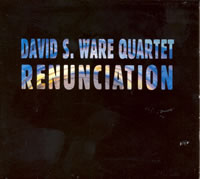 There hasn’t been an album with the finality of Renunciation since the Modern Jazz Quartet’s The Last Concert. Billed as their farewell US concert, the David S. Ware Quartet’s 2006 Vision Festival performance did not simply signal the end of an illustrious ensemble, but an episode, if not an era in jazz history. Despite being a label only a zealot could say out loud without wincing, one that widely missed the point of Ware’s music, “ecstatic jazz” is now embedded in the lexicon of the music at the Millennium, and the tenor saxophonist’s quartet with pianist Matthew Shipp, bassist William Parker, and a series of drummers culminating with Guillermo E. Brown is perhaps forever tagged as its super group. Subsequently, the album’s title was suggestive enough for Ware’s gatefold notes to begin with the disclaimer that he was not in any way renouncing the Quartet’s music. The title merely references the three-part suite that is the centerpiece of the set, which itself stems from Ware’s personal consciousness-raising regime.
There hasn’t been an album with the finality of Renunciation since the Modern Jazz Quartet’s The Last Concert. Billed as their farewell US concert, the David S. Ware Quartet’s 2006 Vision Festival performance did not simply signal the end of an illustrious ensemble, but an episode, if not an era in jazz history. Despite being a label only a zealot could say out loud without wincing, one that widely missed the point of Ware’s music, “ecstatic jazz” is now embedded in the lexicon of the music at the Millennium, and the tenor saxophonist’s quartet with pianist Matthew Shipp, bassist William Parker, and a series of drummers culminating with Guillermo E. Brown is perhaps forever tagged as its super group. Subsequently, the album’s title was suggestive enough for Ware’s gatefold notes to begin with the disclaimer that he was not in any way renouncing the Quartet’s music. The title merely references the three-part suite that is the centerpiece of the set, which itself stems from Ware’s personal consciousness-raising regime.
Undoubtedly, this explanation will only reinforce the ultimate vibe of the album for some listeners, as will the shape and tone of the concert. “Ganesh Sound” opens and closes the set, a magisterial motive that’s more sung than chanted, initially a glowing ember that ignites into wild, blessed fire. Comparisons to Sonny Rollins, from who Ware received early tutelage, go only so far in describing Ware’s playing. But, it goes some way to explain why Ware doesn’t develop such stately materials in a manner that more closely mirrors the open-valve Coltrane-Sanders trajectory. Sure, there are knotty lines, bellowing long tones and vocalizations that are quite far from the Rollins lexicon; the connection to Rollins is something akin to a stream of consciousness that is more associative than absolutist. Shipp’s fundamental comping, a dry jack-hammering of the harmonic contour without embellished torrents, intensifies the material without diffusing it in a blanketing, blinding heat. Parker provides dark subliminal rumbling and Brown thumps and highlights in equal measure. They place Ware’s tempestuousness in bold relief.
“Renunciation Suite” is structurally intriguing. The first part is largely antiphonal, with Ware’s intense solo volleys returned with equal force by the trio of Shipp, Parker and Brown. Ware, Parker and Brown merge for a short roaring exchange, then Ware and Brown go heads up before Ware gives Brown the stage for a lengthy solo that combined the raw “Air” attack of Denis Charles and a regard for space and a utilization of the entire kit that recalls Anthony Williams. The second part is a casebook example of the blunt force created by Ware’s caterwauling, Shipp’s pugilistic comping and Parker and Brown’s massed rhythms; perhaps this is the object of Ware’s renunciation, as the concluding movement is a relatively introspective duo between Parker and Shipp, a mingling of achingly fervent arco phrases and limpid arpeggios knotted tightly. It’s surprisingly that Ware left this culminating work teetering on a precipice. To bring the set full circle, he dips deep into the band’s book for “Mikuro’s Blues,” which is about as close to a mid-tempo Coltranish vamp as the quartet ever ventured, before reprising “Ganesh Sound.” A full three minutes of frenzied crowd reaction ensues before the quartet’s withering encore, “Saturnian,” makes it clear that it’s over.
They say when one door closes, another opens. If that’s the case with David S. Ware, get prepared for something mighty.
